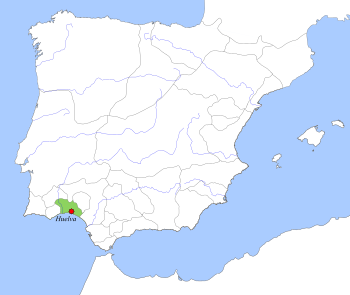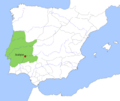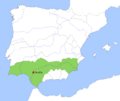Taifa of Saltés and Huelva facts for kids
Quick facts for kids
Taifa of Saltés and Huelva
|
|||||||||
|---|---|---|---|---|---|---|---|---|---|
| 1012–1051 | |||||||||

Taifa Kingdom of Saltés and Huelva, c. 1037.
|
|||||||||
| Capital | Saltés | ||||||||
| Common languages | Arabic, Mozarabic, Hebrew | ||||||||
| Religion | Islam, Christianity (Roman Catholicism), Judaism | ||||||||
| Government | Monarchy | ||||||||
| Historical era | Middle Ages | ||||||||
|
• Established
|
1012 | ||||||||
|
• Conquered by Seville
|
1051 | ||||||||
| Currency | Dirham and Dinar | ||||||||
|
|||||||||
| Today part of | Spain Portugal |
||||||||
The Taifa of Saltés and Huelva (Arabic: طائفة ولبة وشلطيش) was a small Arab kingdom in southern Iberia (modern-day Spain and Portugal). It existed during the Middle Ages, from about 1012 to 1051. A "taifa" was a small independent Muslim kingdom that appeared in Iberia after the main Muslim rule broke apart.
This kingdom was located around the cities of Saltés and Huelva. In 1051, a stronger kingdom called the Taifa of Seville took control of Saltés and Huelva. This happened under the ruler Abbad II al-Mu'tadid. The region remained under Seville's control until 1091.
A famous geographer named al-Bakri was born in the Taifa of Saltés and Huelva. He lived until 1094 and wrote important books about geography.
Who Ruled Saltés and Huelva?
The rulers of the Taifa of Saltés and Huelva were called Emirs. An Emir is a type of prince or commander, often the head of a kingdom.
The Bakrid Family
The kingdom was ruled by one family, known as the Bakrid dynasty. A dynasty is a series of rulers from the same family.
- Abd al-'Aziz 'Izz ad-Dawla: He was the only known Emir of Saltés and Huelva. He ruled from around 1012 or 1013 until 1051 or 1053.
Images for kids
See also
 In Spanish: Taifa de Huelva para niños
In Spanish: Taifa de Huelva para niños
 | Sharif Bey |
 | Hale Woodruff |
 | Richmond Barthé |
 | Purvis Young |



